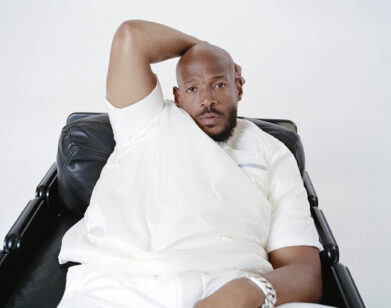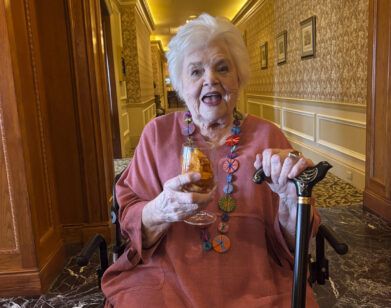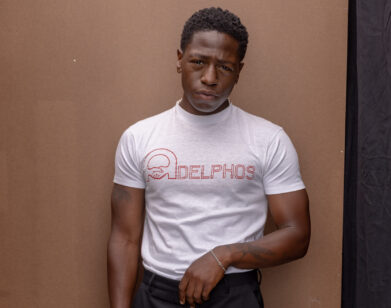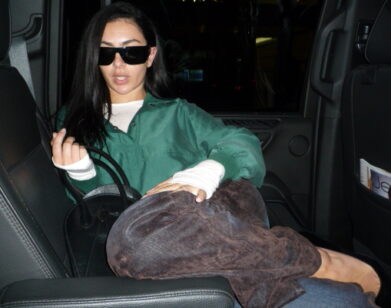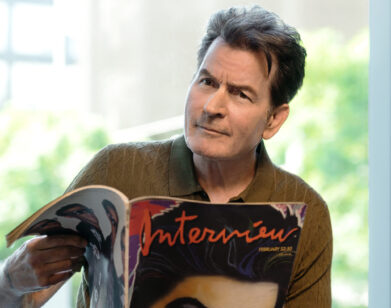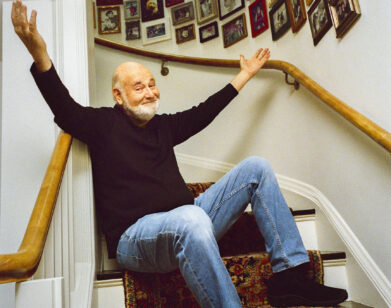Discovery: Vita Hewison
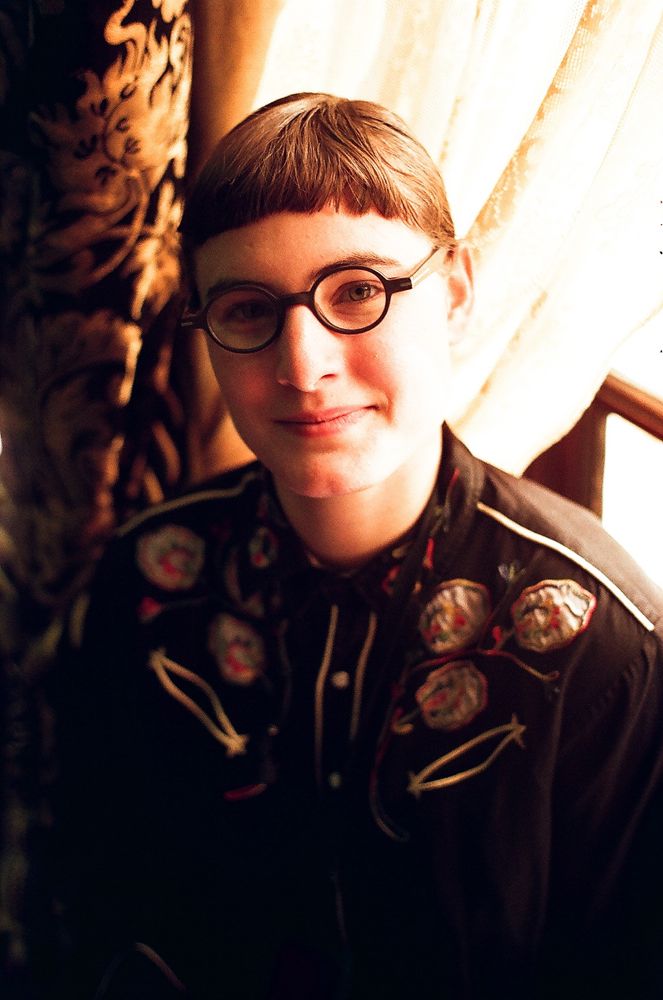
ABOVE: VITA HEWISON
In her film Predella, our newest Discovery, filmmaker Vita Hewison, transforms a familiar corner shop (complete with generic blue-and-white linoleum floors) into a sensually rich forum of conceptual art. Everything is heightened: the hum of the halogen lighting, callous clanking of change, awkward glances of indecisive customers, and the dank solitude of the man behind the counter, waiting to bestow a mysterious present on someone who never appears. We spent an evening with Vita and her wife, Lucy, chatting about Mrs Doubtfire, botanical gardens, and Predella. Before we get into that, however, a few fun facts about Hewison: her first film, Fold, was a finalist for the prestigious Jerwood Moving Image award; she’s passionate about celluloid film; she went to primary school with Interview favorite Imogen Poots; and she’s currently assisting on the set of Emma Thompson’s new film, Effie.
AGE: 22
HOMETOWN: London, England
FAVORITE FILMMAKER: [Andrey] Tarkovsky is probably my favorite filmmaker. When we were teenagers, people would always say “You have to read Catcher in the Rye, because it will change your life as a young person,” [but] I remember reading it, and I didn’t really get it at all, and I didn’t enjoy it very much [so] I kind of put this whole idea of this life-changing text away. Watching [Tarkovsky’s 1979 film] Stalker, which is probably my favorite film, was the “Eureka!” moment in a sense; it confirmed the idea that that was what I wanted to try and work towards. I watched it when I was 16 or so. It’s a Russian film; it’s very beautiful and spiritual… indescribable.
FAVORITE CHILDREN’S FILMS: When you watch a film as a child, you remember so much of it; it becomes all-enveloping, like you’re inside it. I’ll sometimes watch a film that I haven’t seen in a while, and you realise how into it I was at the time, almost like I wrote it myself. Mrs. Doubtfire is one of my favorite films; I watched it again last week. When you watch it again as an adult, you realise that it’s also incredibly naughty. The Witches is also such a good film. I’d never seen it until six months ago, and I must say it’s one of my great discoveries. Would I ever write a children’s movie? I’d actually never thought about that ’til just now. That would be amazing, but it’s so hard to do right. I think you’d have to give yourself the time to learn a bit more before you attempted that.
AESTHETICS VS. SCRIPTS: I always start with buildings, spaces and objects first, and then characters; I’m very much an aesthetics-based art filmmaker. I do like the idea that you can take a single idea or image and expand it and if you’re really intelligent about it you can combine it with other ideas and build this whole… web. [laughs] I like the Brutalist architecture of London—the composition of it, the shapes and the colours, concrete. It’s an aesthetic thing, obviously there are other considerations.
THE IDEAL FILMING LOCATION: I really want to go to Eastern Europe and make a film. It’s very beautiful; I’d like to make a film in Transylvania, but without vampires. It’s gothic, but in a really weird way. There are lots of flowers, but maybe that’s just because I went to the botanical gardens when I was there. I love botanical gardens, a great day out! The best thing is when you come across a little sign saying “This way” and you can just ride your bike to a botanical garden.
ON CASTING: I like to work with people that I know or have met. I met Khalid, who was in Predella, when I was about 13 at the Scarborough Drama Festival; his play was amazing, and he was a very nice man. I would see him every year at Scarborough. [When I was making Predella] I just wrote him a letter and sent him some pictures that I’d taken of corner shops…
UNLIKELY INFLUENCES: I love anything to do with puppets and old-fashioned special effects, anything that’s weighty, it doesn’t matter if it looks realistic or if it looks like it’s made out of plastic. Like these ’80s Italian horror films with SFX plastic hands that they’ve chopped off. How did I get into Italian ’80s horror film? You just have a friend and you go round to their house and they’re like “Hey Vita, want to watch this cool film?” And you watch it and you’re like “Oh my god!” and you fall in love with it and read about it obsessively on the Internet. I haven’t seen any recent Italian horror films; my interest is very niche in that respect, I suppose I could branch out a bit more.
ON CORNER SHOPS: [My film] Predella was [the result of] a very specific obsession I had with corner shops and how they looked inside. I’ve always really loved early or pre-Renaissance paintings where you’re just getting into 3D and the angles [still] don’t quite match up—artists like Giotto and Duccio—[where] the figures are still very flat, the colours are all egg tempura, before oil painting. I love the effect of the very contrived architectural spaces in which the characters are placed and the way that the composition looks. Corner shops—the way they appear as these little light-boxes with a very straight perspective—always reminded me of these pre- and early Renaissance paintings. They became really beautiful [to me]; I became obsessed with them, wanting to use them. I went and worked in a corner shop when I was researching the film. You see all these people [coming in and] buying milk or cigarettes or whatever and suddenly you’re aware of the whole neighborhood. I wrote the film about that.
MAKING A FILM IS LIKE… : A huge puzzle. I enjoy the process of doing it more than anything else, it focuses my mind completely. Do I like doing actual puzzles? Not at all. Actually that’s a total lie, I thought you meant Sudoku, I love jigsaw puzzles. But if you’re going to do one, you’ve got to do it in one day, you’re not just going to have it on your table for ages, it will get ruined. You have to spend the time. My wife’s been avoiding jigsaw puzzles. We could do one later, I’ve got one in the cupboard.
BUT SOMETIMES: Film can feel like a circus. You have to be quite good at dealing with stress I suppose, it’s quite stressful. It’s as if someone said to you “You’ve got to put on a circus tomorrow!” You have to think about where you’re going to set up the circus, where you’re going to put the tents, what animals you’re going to have, who’s going to look after the animals, who’s going to sell the tickets… that’s what it feels like.
FUTURE ACTING PLANS: Definitely not. [laughs] The one thing I learnt when I was in film school was that you should never get in front of the camera under any circumstances. It’s the golden rule. I don’t like being filmed at all, you totally hand control over to someone else. It’s amazing what people can do with a video camera and editing. I sound a bit paranoid. [laughs]

